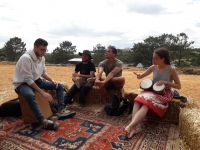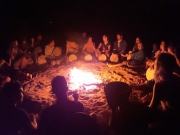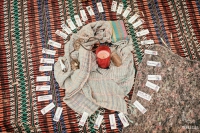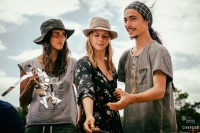Find your way
Follow us on Facebook

Follow us on Facebook

The Heterotopia Tour is designed as an intense human experience on several aspects such as the collective dimension of living, the multicultural gathering of people and the living conditions that are most of the time contrasting with what the participants are used to when they're home.
Living together as a group requires each person to be willing to find a balance between their individual needs and the necessities of the group. The Tour is both at the same time an opportunity and a challenge for the participants to put their ego aside for the collective good, to share knowledge, ideas, points of view, and to develop a sense of reciprocity that they will put into practice during the Tour.
The facilitators will of course support them in this process, but in the end, the participants will be responsible for their group dynamic. Day after day, they will have to imagine creative and non-formal ways to interact with each other, thus improving their emotional intelligences and their skills in group facilitation, mediation or communication.
Thanks to listening to each other, any participant will be able to push themselves beyond their limits and fears for the Other and the Unknown. For the sake of gaining the courage and reaching the joy of discovering “difference” and opening up to new horizons.
In this sense, the Heterotopia Tour offers a chance to re-learn how to listen, respect and support not only the Other person, but also yourself. It will give people the possibility to conquer, build and refine their own identity.
To achieve this goal, the group has to create opportunities for its members to express themselves honestly, through freedom of speech, smooth and open communication between members. All the participants should be able to listen and respect each person's opinion, lifestyle and limits, (while not necessarily agreeing with them), in order to enable each person to trust the others and to feel safe and be in a comfortable emotional zone despite the unusual context that differs from their daily life.
Since bonding with people we don't know and setting a positive group dynamic are not easy tasks, you should focus on the way you can ease the process, keeping in mind the following :
For any community, be it as small as a family or 10ths and 100s of people big, there are tasks and responsibilities that need to be fulfilled, so that life in the community is healthy, happy and peaceful.
Through the daily tasks, the participants will directly experience that “doing their part” is essential for the general well-being of the whole community. They will sometimes do something that they won't enjoy and be tempted to escape; your work as facilitators will then be to (re)motivate them, bringing to light why those tasks are important for the community.
Depending on the venue and existing facilities, the chores will vary a bit, but they will most likely include:
We recommend that you organize one session dedicated to propose, discuss and agree on what all the daily community tasks are in the two first day of the Tour. That way the participants will know about it but also engage actively within it as you will ask them to take responsibility for them since the very beginning.
To arrange a schedule, we suggest you create a common board where participants can sign up freely for one task a day (you will have decided together before how many people will be assigned daily for each task). Encourage people to mix up and to complete the tasks with someone they don't know yet. From our experience, great connections may arise when cleaning the dry toilets, boiling water to prepare coffee or cooking for the community…
To feel home, the participants will also need to master the equipment, knowing what they can use (or not), when and how.
We strongly advice you to organize a comprehensive tour of the camp at the very beginning of the Heterotopia Tour so that the participants are introduced from the first day on to all logistical aspects of their community living. This Tour should at least include a presentation of:
You can read more about the way those areas can be organized in the chapter 5.1 //"Logistics and practical arrangements"// and 5.2 //"Eco-living and ecological footprint"//.
Free-time is not an empty space, a blank in the program without a meaning. It is a need for the participants, so that they can relax, reflect on their experience, digest what happened during the day, share knowledge and know-how and have fun together. Offering free-time implies that the time schedule is respected. If you get out of the schedule, for any reason, it will for sure impact the time the participants will have for themselves after the activity, whatever they want to do with it.
 Keeping up with the time-frame and the schedule requires you as a facilitator to:
Keeping up with the time-frame and the schedule requires you as a facilitator to:
Apart from formal activities (included in the program), the participants should be able to bond through creative activities and fun. For this purpose, try your best to give them access to musical instruments, board games, a basic sound system (to plug a music player to), a “creativity toolbox” with basic tools and material (i.e. strings, pieces of old fabric, a sewing kit, paint and paper, felt tips, etc.). You can also invite them to bring some of their own material (juggling balls, slack-line, board games, music instruments…), knowing that your organization won't be responsible of them (in case they get damaged or broken during the Tour).
From time to time, offer an evening activity such as a cooperative game, a film screening, a storytelling by the campfire, etc. These activities should be optional. As they are not part of the program, each participant may freely decide if they want to take part in it or not.
 From our experience, campfires play a key role in the group dynamic. Therefore we strongly advice that you do your best to make it happen, including for example having a specific session at the beginning of the Tour to build a fireplace in the venue.
First you should gather information on the fire regulation in the area you are going to, including temporary local laws that might apply during the summer period. Remember that a well designed, safe space for fire may allow you to get granted special authorization. Ask your local authorities about their prerequisites.
From our experience, campfires play a key role in the group dynamic. Therefore we strongly advice that you do your best to make it happen, including for example having a specific session at the beginning of the Tour to build a fireplace in the venue.
First you should gather information on the fire regulation in the area you are going to, including temporary local laws that might apply during the summer period. Remember that a well designed, safe space for fire may allow you to get granted special authorization. Ask your local authorities about their prerequisites.
Generally speaking, having at least a place where people can feel free to chat, hang, play will help them relax and feel free to enjoy the time they have together the way they want to. Simple furnitures such as (waterproof) carpets, straw or wood benches, a piece of fabric offering shade, etc. are more than welcome.
No matter how good your facilitation and how cooperative the group, tensions will arise at one point or another: the behavior of a person can have an emotional impact on someone else even if no harm was meant.
You will have to deal with those tensions regardless. By offering a space for each person to express themselves, you might solve most of the misunderstandings and find the core of the problems. This will enable you to come up with win-win solutions together.
Introduce the participants to methods and tools to better communicate and work together from the beginning of the Tour such as Non violent communication or Artful participation. It will help them live together, prevent tensions as much as possible and address tensions when they occur.
 Encourage them to take into consideration the consequences of their behavior on the group and to consider the bigger picture. Even after the Tour is over it will be a precious skill to acquire or strengthen in the long term.
Encourage them to take into consideration the consequences of their behavior on the group and to consider the bigger picture. Even after the Tour is over it will be a precious skill to acquire or strengthen in the long term.
Since it's far from easy to prevent tensions, help people express and address tensions in a constructive way, we recommend you to put some methods such as Base/Family Groups and Sharing Circles into practice as described below.
A “Base group” (also called “Family Group”) is an opportunity for each participant to speak their mind within a smaller community (of 6-7 participants) inside the large one. The intention behind it is to enable the participant to share with the others and with the organizers how they feel and how they would like the Tour to develop. It is a reference point for each participant every day and a way for you, as facilitators, to know how people feel and adapt accordingly. It should build, little by little, a high level of trust between you and the participants.
To be efficient, we believe Base groups should be formed on the first day of the Tour, by random or by nationality (depending what you feel is more appropriate for your group). Each Base group will meet towards the end of each day (except the days of evaluation and when a public event is offered), usually before diner. Using various guidelines and methods, the participants will share their feelings and thoughts regarding the day: How they experienced it, what they enjoyed or disliked, what they didn't understand, what they missed, what they have learned, what they believe could be done in a different way in the following days in order to improve the experience, etc.
 Remind the participants that the Base group relies on active listening, empathy and welcoming the point of view of others; everyone should pay attention to what the other says, and benefit from being carefully listened to as well. Encourage them to be specific on what passed through their minds during the day, which expectations were fulfilled but mostly, which dismay they faced. Take a close look at the moments of discomfort and focus on new ideas to solve a problem or to get in touch with a sensible issue. Make it clear that it is not a specific person who is targeted but the problem. Remove the responsibility for a problem from a specific person's shoulder and make it the group's task to solve it together.
Remind the participants that the Base group relies on active listening, empathy and welcoming the point of view of others; everyone should pay attention to what the other says, and benefit from being carefully listened to as well. Encourage them to be specific on what passed through their minds during the day, which expectations were fulfilled but mostly, which dismay they faced. Take a close look at the moments of discomfort and focus on new ideas to solve a problem or to get in touch with a sensible issue. Make it clear that it is not a specific person who is targeted but the problem. Remove the responsibility for a problem from a specific person's shoulder and make it the group's task to solve it together.
Some topics that arise may be really heavy or really emotional. If it sounds too big to be fully addressed now, don’t address it for too long. Give it space and time and address it through propositions to the organizing team.
We suggest that the members of the organizing team won't take part in these sessions: only group leaders will, and this only at the beginning of the Tour (for a week for example) in order to kickstart the dynamic and help the participants to understand what a base group is about and how it can be facilitated. Then, the group leaders will take a step back too and leave the base group in the hands of the participants. That way, they might find more freedom to express themselves intimately. Once the Base group of the day is complete (in the way the participants felt it is fulfilling), one of its members will redirect to the organizing team the main points that emerged.
The value of the Base groups, apart from offering a safe place to speak outside one's brains, is to help identify the challenges the whole group is dealing with and consider the next steps accordingly. Thanks to it, each one’s personal closure of the day - that consciously or subconsciously undoubtedly happens – will get into a collective process, into a sphere embracing each individual in a sense of a “community”.
The sharing circle is an excellent tool to allow participants to express themselves in a safe environment, in a creative way. It reinforces group dynamics and gives space to expression to participants who haven’t yet talked so much in plenary.
We believe it can be a good activity before an evaluation as it enables all the participants to express their emotions and reinforces the sense of the group. This way the participants can have a better focus on analytic evaluation and have a stronger team-work for finding solutions. You can also use this activity when you feel like there is tension or frustration in the group that has to come out and be addressed.
Although it seems simple, a successful Sharing Circle requires a few rules and guidelines. From our experience, we recommend the following:
Keep in mind a Sharing Circle takes time (Number of participants x Time of expression of each person + time for explaining the guidelines + closing the activity), so make sure you won’t do it in a rush. Closing the activity might also need some time, because sharing circles can be very emotional and the participants will need time to process. For this reason, we believe it is better to implement it as the last activity of the day.
Last but not least: Remember that the successful implementation of a sharing circle requires an already existing, at least basic trust-level between participants, otherwise they won’t feel safe to express themselves in front of each other. Consequently, do not to use this tool in the very beginning of the Tour: it will most likely not yield results.
